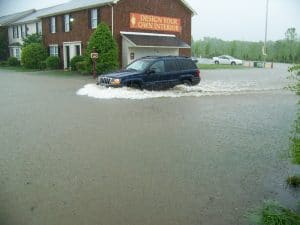Things to Consider Before Getting a Coastal Home
Purchasing a coastal home is one of the most exciting decisions you will ever make, so ensure that the process is enjoyable.

Unsplash Image
Having a second home in a location that makes you feel like you are on vacation all year long is a dream come true for many people. Consider the following before purchasing a home on the coast.
Insight
For many of us, waking up to the sound of seagulls and the gentle sounds of waves on the beach is paradise. It takes us back to happy childhood vacations spent building sandcastles on the beach and eating fish and chips straight from the container.
Purchasing a seaside property allows you to relive simpler times and escape the hectic pace of modern life. It’s a place to de-stress, relax, and inhale some refreshing sea air. Real estate experts like NextHome on the Coast can help you get a perfect home on the coast.
If you are considering getting a seaside home, here are some things you should know.
Location
 There are three factors to consider when choosing where to live, but they are much more critical if you consider living near the beach. First, not all beaches are the same. Some are more popular with visitors, while others are more isolated and off the beaten track. Second, while some beachfront homes are surrounded by lovely, pristine beaches, others are surrounded by rocky crags or hazardous surroundings.
There are three factors to consider when choosing where to live, but they are much more critical if you consider living near the beach. First, not all beaches are the same. Some are more popular with visitors, while others are more isolated and off the beaten track. Second, while some beachfront homes are surrounded by lovely, pristine beaches, others are surrounded by rocky crags or hazardous surroundings.
Conduct extensive research and take the time to stroll around the area. Make sure that the location fits your requirements and expectations. Also, evaluate municipal records to see if any major projects are planned any time soon.
Many individuals place a premium on the location of their home within their community. Some individuals choose near the main entrance, while others prefer to be deeper into the complex and away from traffic.
If a park, pool, or leisure area is nearby, some owners may choose the nearest accessible lot. Likewise, dead ends are preferred by some, while others prefer to live on the main boulevard. Discuss your choices with your agent and inquire if particular lot sites command a higher buying price.
Size
Many individuals pay little attention to the size of the land on which their home is built. Within a community, lot sizes may be very comparable. Once you begin attending showings and examining the inventory, you will quickly discover if you have a distinct preference for big or tiny, corner or inside.
If there seems to be a difference between the boundaries of one lot and the boundaries of another, verify the lot description and measurements with your realtor. Consider the possibilities if you come across a home that contains two lots.
If the second lot is buildable, you could add another structureStructure refers to the framework or components of a buildin... More (additional garage, workshop, etc.), or you could divide the property and construct a second home and sell it separately, or you could sell the lot as-is.
Know Your Neighbors
Neighbors are important. They will be able to assist you in navigating the area. Are there any youngsters in the area? If you have children, they will almost certainly desire to play with other children. On the other hand, you will want to avoid living in an overcrowded neighborhood densely packed with party homes.
Additionally, we will discourage you from purchasing in distant, difficult-to-access areas. Isolated locations are attractive to robbers and criminals. To compound matters, they may be inconvenient during crises and times of need. As with any property purchase, the area is critical.
Home Inspection
A home inspection is usually important, and even more in coastal regions. A home inspector will check for indications of natural aging and those caused by the sea and its storms. An inspector will be able to determine whether the home has flooded and how often this occurs. Electrical systems, foundations, timber, and moldMold is a type of fungus that grows in damp or humid conditi... More are all severely damaged by floodwaters. These damages may be very serious and repairing them can be quite costly.
If there are indications of floodingFlooding is the overflow or accumulation of water in areas t... More in the home, our recommendation is to leave immediately. If raising the home is a possibility, consult surveyors and contractors. Numerous coastal residents are already raising their homes to avoid future floods.
Get a Realtor
If possible, get a reference from a friend. A realtor will be familiar with the area’s ins and outs during both peak and off-peak seasons.
When was the last time there was a major storm? How much harm did it inflict? This is critical information to determine. As we stated before, it is usually a good idea to get to know your neighbors; in this case, it is more beneficial since they can fill you in on details that a realtor may overlook. Communication is important. Communicate with as many individuals as possible.
Price
Before beginning your search, you should set your price range, estimate a budget, and get pre-approval for a loan. Purchasing a single-family home is a significant investment, and it always involves more than the purchase price. Consider how these expenses will impact your budget and adhere to your price range and mortgage payment choice.
HOA Fees
If the beach home is not your main residence, you may need the services of a property management company to look after the place while you are away. This requires someone to coordinate all pest control services, landscaping, and maintenanceMaintenance is the routine care, inspection, and repair of a... More requirements, as well as leasing agreements. If your beach home is part of an HOA neighborhood, the HOA may be able to take care of these requirements for you. Fees for these services may be very high and should be included in your beach home budget.
Protection from Water
 Coastal homes have unique care requirements compared to other properties due to their exposure to the elements and weather. For example, they may be harmed by salt air corrosion. When inspecting coastal homes, check for rusted metals and rotting timber.
Coastal homes have unique care requirements compared to other properties due to their exposure to the elements and weather. For example, they may be harmed by salt air corrosion. When inspecting coastal homes, check for rusted metals and rotting timber.
Once your offer on a home has been approved, you should arrange for a property survey, ideally a complete building inspectionInspection is the careful examination and assessment of a pr... More. A chartered surveyor will check for indications of age-related wear and tear and damage caused by the water.
Conclusion
Home is where the heart is! So, if your heart desires to be at the beach, there is no reason why your home cannot be there. Spend time researching and investigating your options to avoid your intention of living on the beach becoming a sandy, costly nightmare.












